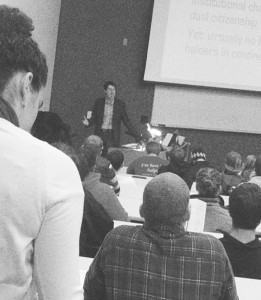
Rensmann, a visiting professor from Germany who teaches in the Political Science Department at the University of Michigan, defined cosmopolitanism as “the recognition and acceptance of diverse others.”’
Prior to Rensmann’s presentation, Rebecca Sammel, professor of english languages and literature and project leader for “Critical Encounters with Globalization”, said, “We started a speaker series to discuss globalization issues around the world.”
“We want Ferris students to be prepared to go out into the world,” said Sammel of the presentation’s purpose of educating students on issues relating to culture and diversity.
Professor Rensmann said the crowd that gathered in IRC 120 to view his presentation stunned him.
Those who may not have been able to listen to his presentation were told they could participate in an informal discussion with Professor Rensmann at a “Reception and Roundtable Discussion” later that day.
“We have to realize Europe had a messy starting point,” said Rensmann at the beginning of his presentation. He described Germany as a “devastated and destroyed continent.”
Rensmann discussed the concepts of continuous political authoritarianism and dictatorship that once ruled over Europe. During the eighties and nineties, Europe faced pressure for globalization; in 1992, they were asked to tear down borders between the unions, making way for more acceptance of diversity.
“European people have a strong sense of ethnic nationalism,” said Rensmann. He spoke on the idea that human rights “should be more universally enforced today than in the past. “
Cosmopolitanism in Europe shows that Europe has transformed in many ways and accepts many forms of diversity, explained Rensmann.
“Cultural changes lead to a more cosmopolitan outlook on the world,” said Rensmann as he discussed concepts of diversity and cultural change. He noted that Europe still lacks public representation and falls short of being a cosmopolitan diverse continent.
Rensmann explained to the many students attending that cultural issues are becoming important, “we need to adjust to a more diverse world, and some are afraid and reluctant to adjust to a diverse world.”
“There are a lot of shortcomings in spite of all the change,” said Rensmann.
The idea of a “hyphenated identity”, Rensmann explained, was the concept of someone having more than one identity, such as someone who is German and Turkish. “It’s ok to have more than one identity, it becomes more accepted,” he said. “There is no success without international diversity.”
Caitlyn Benson, pre-dental hygiene major, said, “It was really interesting to see how they view things like immigration and other stuff.”
“Critical Encounters with Globalization” was one of four ongoing projects of the Globalization Initiative group at Ferris.
